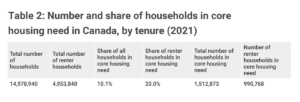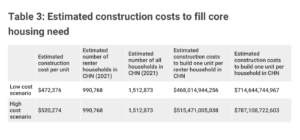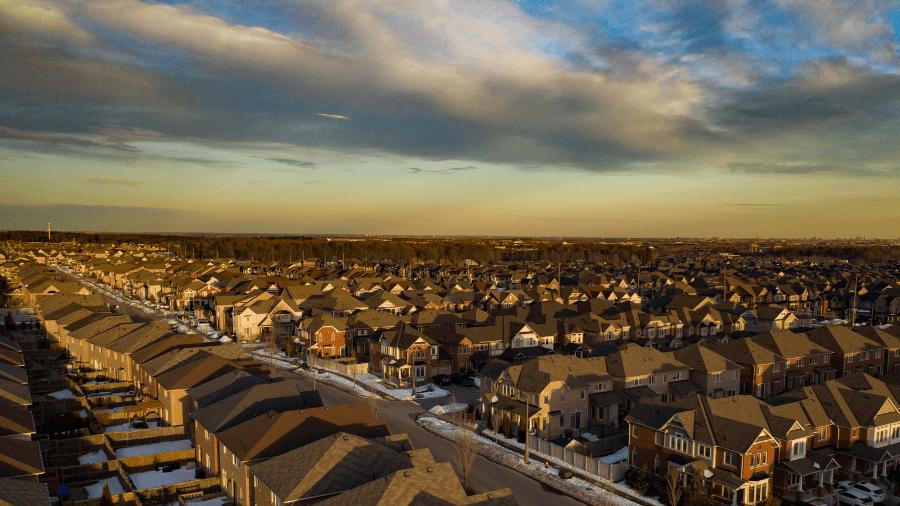By Steve Lafleur, December 11, 2023
Social housing is an important part of the housing mix. Some people will simply never be able to afford market rate housing. And given the dire shortage of housing in Canada – particularly in the largest cities – we need to unlock as much new housing as possible. If governments have outside-the-box opportunities to add to the housing stock, like social housing initiatives, now is the time to pull out all the stops. This is particularly true given the difficult financing situation facing developers posed by high interest rates. An all-of-the-above approach on housing is warranted.
While social housing (i.e. government or public housing) certainly has a place in the mix, some people go further, arguing that it’s the only type of housing that’s needed. In their telling, market rate housing doesn’t help with housing affordability. Federal NDP leader Jagmeet Singh articulated this perspective in a recent television appearance.
“I met with people who told me, we cannot afford the cost of a luxury condo. That’s not going to make my life better. You build a whole bunch more towers of luxury condos, they’re out of my reach. That’s not going to help me and my family out. So we need to focus on affordability.”
Let’s put aside the argument about whether new market rate housing contributes to greater affordability. We’ll focus instead on the idea of meeting all of Canada’s housing needs through public housing. What would that cost?
In a recent paper for the Macdonald-Laurier Institute, Josef Filipowicz and I estimated the potential cost of a public housing buildout of a sufficient scale to restore affordability. Rather than try to generate a precise, realistic number, we presented a very generous range of costs, including only the “hard” construction costs. We assumed no land costs, no fees or taxes, and low construction costs. We arrived at an estimate of $196-$300 billion.
Our intention in that paper was to put a floor under the debate. In other words, we wanted to estimate the absolute lowest cost for such an undertaking that is remotely defensible to highlight the magnitude of the funding requirements from a social housing only approach. We decided in that paper against attempting to estimate the real-life costs of social housing construction, since there hasn’t been a large-scale social housing buildout in Canada over the last few decades to use as a benchmark. However, that’s about to change.
The City of Toronto has announced an ambitious plan to build 65,000 social housing units. Of those, 60,545 are presently unfunded and will require funding from both the provincial and federal governments. The city estimates the cost for those units at between $28.6 billion and $31.5 billion. As Table 1 shows, the costs per unit under those two scenarios would be $472,376 and $520,274, respectively.

Source: CBC News, Toronto’s new plan to build 65,000 housing units hinges on billions in provincial, federal funding.
Now, let’s consider how many social housing units would be needed nationally to address Canada’s entire housing shortage under those cost assumptions. There are a number of ways to calculate how many housing units are needed. The Canada Housing and Mortgage Corporation (CMHC) estimates Canada will need 3.5 million additional housing units by 2030. Josef and I took a more conservative approach in our paper.
Table 2 shows the number of Canadian households in “core housing need,” as defined by CMHC. To be considered in core housing need, households must fall below specific standards of adequacy, suitability, and affordability, and must spend more than 30% of their before tax income in order to access housing that meets all three standards. This gives us a range of between 990,768 and 1,512,873. This, like the cost estimates, was a very conservative estimate that I will use once again here. Also note that these numbers are from 2021, the last census year. Given strong population growth and rising housing prices since then, the numbers have almost certainly increased.

Source: Macdonald-Laurier Institute, Government can’t do it alone: Estimating the cost of building enough homes to meet Canada’s core housing need
Table 3 applies the cost estimates derived from the Toronto plan to core social housing need. Since there is both a range of cost estimates and estimated number of units required, we came up with four estimates ranging from $468 billion to $787 billion. That puts the range for a national social housing buildout based on the Toronto numbers at between 56 and 162 percent higher than our original high-end estimate of $300 billion.

Source: CBC News, Toronto’s new plan to build 65,000 housing units hinges on billions in provincial, federal funding
Now, one might wonder if this estimate is fair. After all, not all units would be built in Toronto. However, most of the need for housing units in Canada is in larger metropolitan areas and the variations in construction costs aren’t as high as one might expect.
Consider the hard cost estimates from Altus Consulting that Josef and I used as the basis for our original estimates. The Altus report has estimates based both on type of building and location.
Let’s consider condominiums/apartments up to 12 stories. The report presents a high and a low-cost scenario for each city. The lowest cost market in this category is Halifax, with a range of $180-$255 per square foot. Compare this to the GTA, which ranged from $275-$380. So there are indeed large spreads between the most expensive and least expensive markets. But the Maritimes are a small portion of the overall population, and therefore of our housing needs.
The cost variations are far smaller inland. The range for Edmonton, Calgary, and Winnipeg is $260-$320. That means the low-end estimates are only roughly 5.5 percent lower than in the GTA in these three cities and the high-end estimate is roughly 15.8 percent lower. These aren’t earth shattering differences.
It’s certainly conceivable that the costs of a large social housing buildout would be lower per unit in some markets than the Toronto estimate. Of course, it’s also possible that the Toronto estimate is not only too low for Toronto, but for other markets. Cost inflation on large scale projects isn’t merely possible, but typical.
While it is impossible to know what the actual cost will be, the City of Toronto deserves credit for using what appear to be plausible cost estimates. However, this should also highlight the prospective costs of a social housing first approach, let alone social housing only, would be staggering and prohibitive.
Social housing has an important role to play in the housing mix. But the costs of a social housing only approach to addressing the housing crisis would be staggering. Using the cost estimates for the City of Toronto’s social housing plan, the cost would be somewhere between $468 billion to $787 billion if social housing were pursued as the sole solution to our current crisis. This highlights that governments can’t do it alone. We also need market rate housing construction, and a lot more of it.
Steve Lafleur is a public policy analyst who researches and writes for Canadian think tanks.






